Irin ajo mi si Nigeria | My journey to Nigeria
Posted by Mariana Rama Pedro Alves, on 17 April 2020
This year I had a unique experience arising from my PhD – 2 weeks giving training in Nigeria, by invitation of Prof. Amos Abolaji from the University of Ibadan. Amos established one the first Drosophila labs in Nigeria in 2014, and in 2017 he co-organized workshop with DrosAfrica – a charity I collaborate with and that you should check out. I met him after we invited him to our EMBL PhD symposium in 2018. He kindly invited me to be a trainer at a Drosophila workshop he was organizing in Abuja in March last year, and to visit his lab in Ibadan too – to do embryo collections and stainings together, but also to prepare science outreach activities and visit two schools. In this article, I am going to share my experience and perhaps convince you to take on a similar adventure too.
Warm weather, warm hearts
When I got off the plane, which arrived to Lagos at 9pm, I didn’t know what to expect. It was hot, really hot! It stayed like that for the two weeks: we had on average 40-degree days, sometimes with a sensation of more. Amos was there to pick me up, dressed in traditional Yoruban clothes. My first impression of Nigeria remained loyal to what I would experience the following two weeks: very warm weather, very colourful attires, very warm and joyful hearts. Also, it is loud, there is always sound…In fact, when I returned home, one of my strongest impressions was that Heidelberg felt extremely quiet even though I live in the centre, which can be quite noisy. The Yoruba language sounds very musical – I learned a bit but wish I had learned more. I stayed for 9 days at the University of Ibadan (UI) and 5 days in Bingham, near Abuja. It is important to note that Nigeria is very big and multiculturally diverse, so what I share mostly reflects what I witnessed more closely in the South West region. I was the only visitor for a week, and, on my 7th day there, Dr. Alex Whitworth joined. Alex is a group leader at the MRC Mitochondrial Biology Unit in the University of Cambridge. It was great to experience both ways: all the new things you discover on your own, fully immersed, but also having someone from a (more) similar background to share experiences with. Alex was an incredible travel buddy to whom I am super grateful, and it wouldn’t have been the same without him; he also showed me that PIs can be cool travel buddies too! Finally, I had heard before going that food was spicy. Well, food is really spicy, and portions are very generous.
No excuses
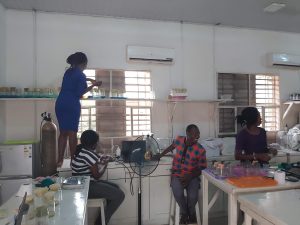
The Nigerian scientists I met had a constant mindset of “no excuses”, which comes from trying to overcome lack of resources with perseverance and creativity. This was not entirely new to me. In Portugal – where I come from and where I started working the bench – there is also this attitude. We had to plan seriously and we would coordinate with neighbouring labs to make sure resources were used to the maximum. At EMBL the conditions are very different, as we are quite wealthy and I would say a lot of people (including myself) are spoiled. There are a lot of things we don’t have to worry about such as preparing buffers, animal diet, washing our glassware etc.
We have the tendency to believe that science is objective and therefore democratic. But science is made by humans, and the socioeconomic context plays a huge role in the opportunities people have to realize their potential. If I felt a resource gap after travelling 2000 km between Portugal and Germany, this was even greater with the 6700 km between Heidelberg and Ibadan. I am not talking about not having fancy equipment. I am talking about, for example, not having constant power supply. What does that imply? It implies that you need to spend so much more time caring for the animals – flies in this case – which would be happier less 10-15 degrees Celsius of heat. It implies that you might have to run experiments until 5am because electricity is more stable during the evening. I met students who literally did this. And these students often face overscrutinity of their research credentials by recruiters in US/EU institutions, without taking into account the context and resources in place. Excellent people who dream about great experiments to their bold hypotheses, but sometimes cannot perform these tests with what is available to them. But still, they say “no excuses” – they are very creative to always find a way to improvise. This was true both for the Abolaji lab in UI and also the Bingham workshop participants I met in Abuja. I had heard Amos talk about the lack of power supply when he visited EMBL, but these are things you have to see for yourself to really grasp it. It is important, for the less aware, not to confound excellence gaps with resource gaps. And importantly, in Amos’ lab they share a lot of their equipment with other labs in the department. Since they have a KVA inverter to make up for power shortages, they even share power sockets: I often saw visitors coming in just to use their laptops and plug them in or charge their phones. This contrasted a lot to me with what I have seen in some Western labs, sometimes in the same institute, not wanting to share machines or reagents.
Adapting to your context
The culture I am used to doing science & science outreach in (from my experience in Portugal, UK, Denmark and Germany) is different from the culture of Nigeria. Again, this was not my first cultural shock, as I experienced it by moving abroad, first to the UK and then to Germany. Even after almost 3 years in Germany, I still struggle to adapt to some things. I also had been to Africa before, but it had been 10 years since I was there last, and this time it was for work, not vacation, and on my own, not with my family.
I love making plans and scheduling things to the detail. I am not super punctual, but with African time, there was never a dull moment. Even after some days of realizing that the pace of life was different, our brains are so wired in habits that Nigeria found ways to surprise me everyday. And I think that is great! In EMBL, if a seminar is at 1pm, it starts latest at 1.05pm. In Portugal, the lights of the amphitheatre would probably still be off at 1.05pm, and the audience joins around a quarter past. I felt that in Nigeria it was even more flexible. But this also needs to be put into context. Sometimes I was surprised by some breaks during the middle of the day, but it made sense because we experienced such hot weather (hot even for Nigerians themselves!), that it made more sense to continue going after it cooled a bit off in the evening, and we could stay until late. We made it to a domestic flight after arriving to the airport 15 minutes before departure, which was quite an adventure for me, but the friends I made there assured me that there usually is no “African time” for flights! In terms of planning, I would just say that no amount of planning is too much!
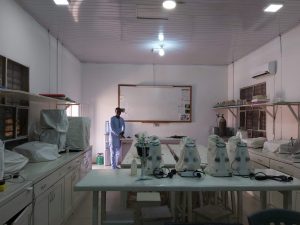
I was used to certain health and safety measures from Europe, for example for dealing with chemicals. Guess what, if you don’t have many resources, it is hard to handle chemicals with such care. For me that was initially quite a shock, but eventually that shock grew into respect of the scientists I met who have to make much more sacrifices, including health and safety ones, to carry on with their experiments.
For me, the biggest lesson was that it takes more than ‘adapting’ to fully learn and grow from such an experience. You can go along new circumstances but still be making judgements on your mind, rejecting the new reality because it is done different from what you are used to. It is the jump from that to accepting and embracing it that makes all the difference. If I could go back in time, I wish I had resisted change less in my mind and had learned to accept it quicker, because without judgement you can live better in the present moment and make the most of it. Still, my new friends and fellow students there say that I adapted quite well! They would say – and this is a phrase everyone uses all the time, you just need to make eye contact with someone and you will hear it – “well done”.
Adapting to your audience
I was also faced with cultural difference in how to do outreach. And I remembered the motto “Adapt to your audience”. Instead of resisting different ways of doing it, I realized that the local way is probably the most effective, because the audience is local too. And I believe this goes beyond science communication. If we want to contribute to scientific capacity building, we cannot think we can turn up somewhere and just impose the way we are used to doing it. Again, the contexts are so different, how could there be a one size fits all approach? Regarding the school visits, it was great that these were made as team with the Abolaji lab, who taught me a lot about how to use flexibility and improvisation and also about approachability skills with kids. As curiosity, I was surprised that every single lab member out of 6-7 that came for these visits were natural talents with kids. How come not even one was an odd one out like me? I love doing outreach but I feel very shy. In the Nigerian context, besides having big families of 3+ siblings, the big religious influence means most are used to dealing with kids and to passing on (other types of) information to them. In fact, their deep religious practice makes them great storytellers, which is a key skill for science communication. This was also a great lesson, since we can antagonize science and religion without looking into the full picture.
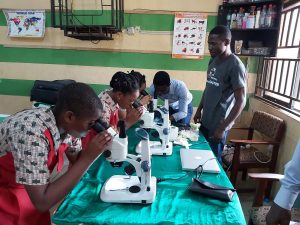
Outreach for development
Being involved with DrosAfrica – which wants to use the power of Drosophila to empower scientists all across Africa and has plans underway to build a big new institute – and looking up initiatives of scientific capacity building, I didn’t quite realize until being there how relevant outreach and science communication is in this context too. I always thought that there was so much to build for the research practice per se, that I didn’t realize I was putting outreach in a “bonus” category. But the way outreach is intricately involved in research is truly universal and outreach shouldn’t be neglected by the pressure of building core resources in labs. After all, we should spark interest in the young and spread science to society to help strengthen the developing scientific structures. So, I would like to encourage professional science communicators to pay it forward and embark on similar exchanges and visits too. Take your expertise where it can be so valuable and I guarantee you will walk home having learned a lot of new things too. I wrote specifically about my school visit experience in the EMBL School Ambassador website and you can check the EMBL-Nigeria pen pal project I started with my colleague Rafael Galupa in our blog.
Combating imposter syndrome
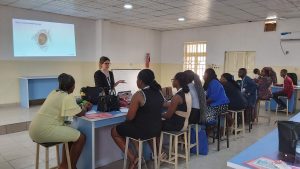
As a PhD student, I strongly felt imposter syndrome when I was invited to train and teach, and that it was a big responsibility and investment for the little amount of knowledge I felt I could pass on. But I realized two things:
- Even if you have less experience than a professor, you have a relatability factor that has great power speaking to young people like you.
- I didn’t realize how many tools I have gathered from different experiences, and I was surprised to be able to go back and pick them up to share – such as a model used for a school visit or a draft structure a friend once sent me for a motivation letter I had to write. For me this underlined the interconnection of my life experiences and reminded me the hidden value of subtle things or experiences you don’t think about often anymore.
I also learned that the most effective way to contribute to scientific capacity building is to collaborate – meaning visiting, sharing expertise, sharing grants together and sharing or exchanging students. Finally, even if I am shy to admit it, I must say that I left Germany with the mindset that I was going there to teach. I was excited about this new experience, but I only realized after I arrived, that I was also going to learn A TON. And, for sure, I brought more with me than I left there. I swear that this did not come from arrogance but from naivety. If I had focused earlier on how much I would also learn, maybe I would have worried less about my imposter syndrome.
A final message
“Nothing in life is to be feared, it is only to be understood. Now is the time to understand more, so that we may fear less.” Marie Curie
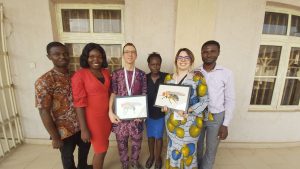
Oda-aro in Yoruba means good night, but in my heart it means seen you soon. I miss the warm friends I made there, I miss their uncontained joy, their spontaneity and generosity, their wise and serene takes on life (which actually brought me closer to religion), I miss the colourful attires in the street and the feeling like I time travelled to summer in February. I miss the hawks which flew around the UI campus and the hazy sky. I try to make it up with listening to Nigerian music almost every day and staying in touch.
When I told people around me I was going to Nigeria, a country where the travel security advice is quite grim, I was met with so much resistance and doubt – it cannot be overstated. You hear not only about petty crime or terrorism but also about regular kidnappings, and the advice not to travel by road or be out in the dark makes one realize security things we take for granted, at least I did in my quiet Heidelberg home. And yes, I was hesitant and apprehensive, but I trusted my guts and my values: I deeply believe that science is global and has to be shared. And I put my actions where my words were: I went. It was crucial for me that I had the support of DrosAfrica and that I trusted my host – who was incredible – and this is something you should take into account too. Everything went fine, but I lived a very controlled life: I never left campus or walked around after dark without company; for the outreach, we visited gated schools with security; our accommodation was chosen strategically; between Ibadan and Abuja, we took a plane instead of the road. Indeed, I heard of the precautions people take in their daily life in regards to which cabs they get into; I heard a testimony in a church service about a kidnapping that fortunately ended well. But the people I met live regular lives which didn’t seem to me to be overwhelmed by these issues. So although we had no issues, I also confirmed that indeed, the travel advice is based on threats that do exist. This for me presents an interesting paradox: if we haven’t been somewhere, we can only rely on the pictures the news gives us. But if you take precautions, that shouldn’t be a reason to stay home, because there is so much life behind the news, and even I speak humbly from a miniscule experience of 2 weeks. So much warmth, so much culture, so much diversity, news ways of living and thinking and looking at science and life and on and on…
If you read this and you are torn, please go. Prepare, take cautions, but go!
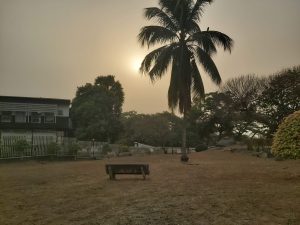
This visit had the support of DrosAfrica, for which I am very grateful. In particular, thanks to Isa Palacios for always being there. ELLS and EMBL Comms supported the school visits – thanks Eva and Verena! I am grateful to my supervisor Justin Crocker for being supportive and to several colleagues (in and out EMBL) who shared material, insight, and especially those who shared encouragement.
Don’t know where to start? Check these links out:
https://www.clubesdeciencia.org/
https://www.cambridge-africa.cam.ac.uk/
https://www.neurochemistry.org/international-travel-support/


 (13 votes)
(13 votes)
Your reportage is quite interesting and balanced too. You gave a vivid picture of the challenges as well as how scientists here in Nigeria have tried to circumvent this painstakingly to achieve some level of success, and that is quite commendable. So I say, “well done”.
I look forward to having such an experience in another clime too.
Thanks a lot for sharing! It sounds like a very important and valuable experience!